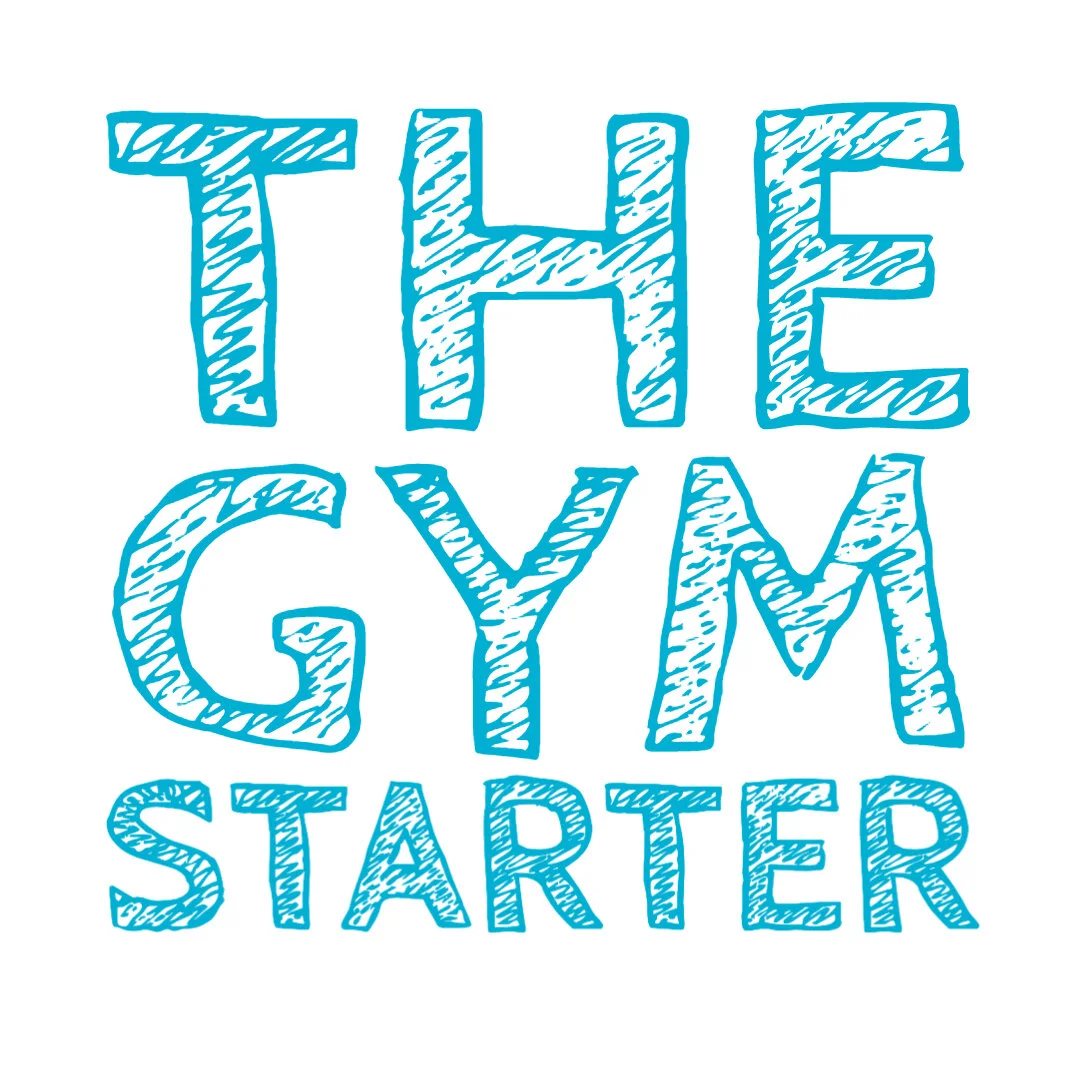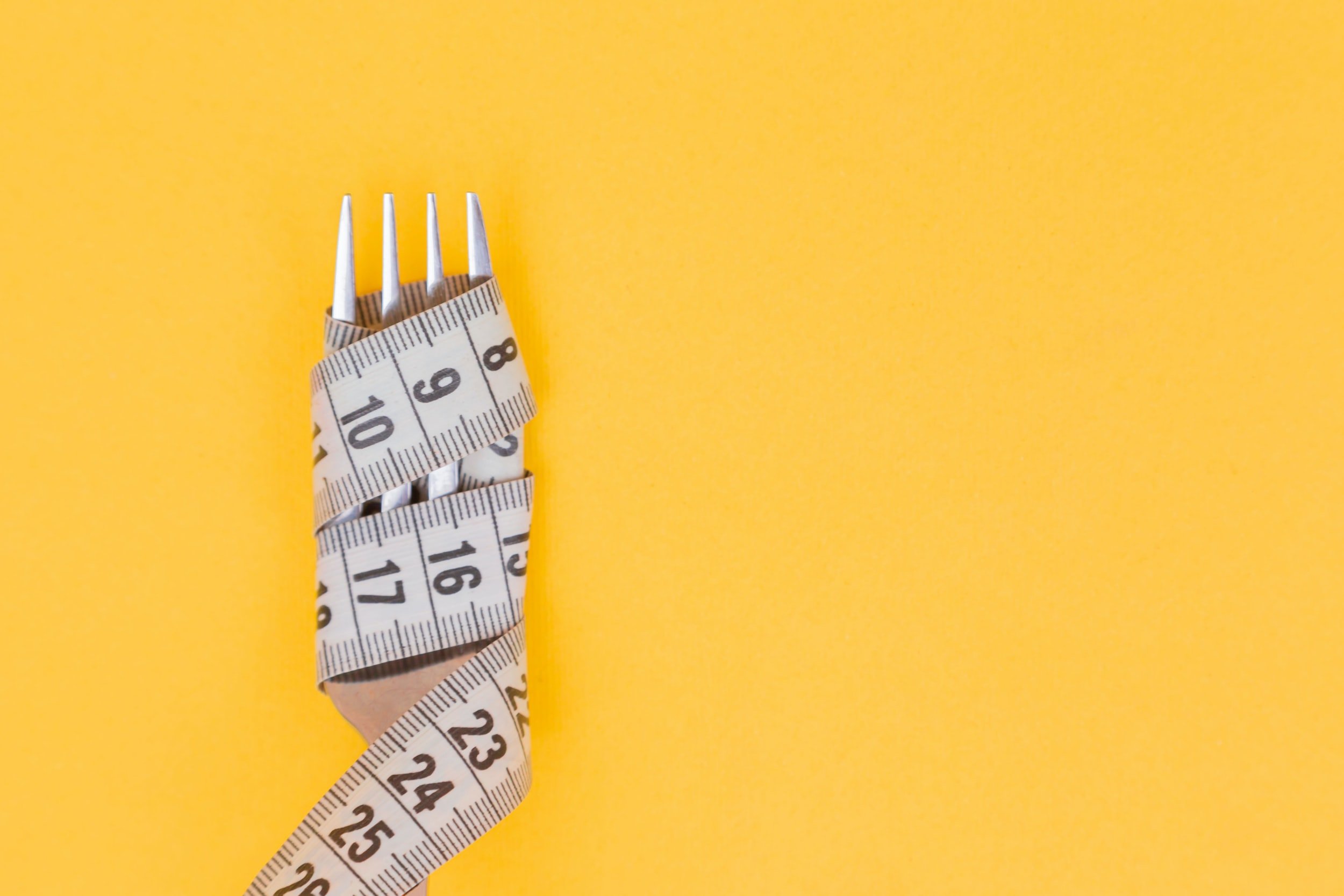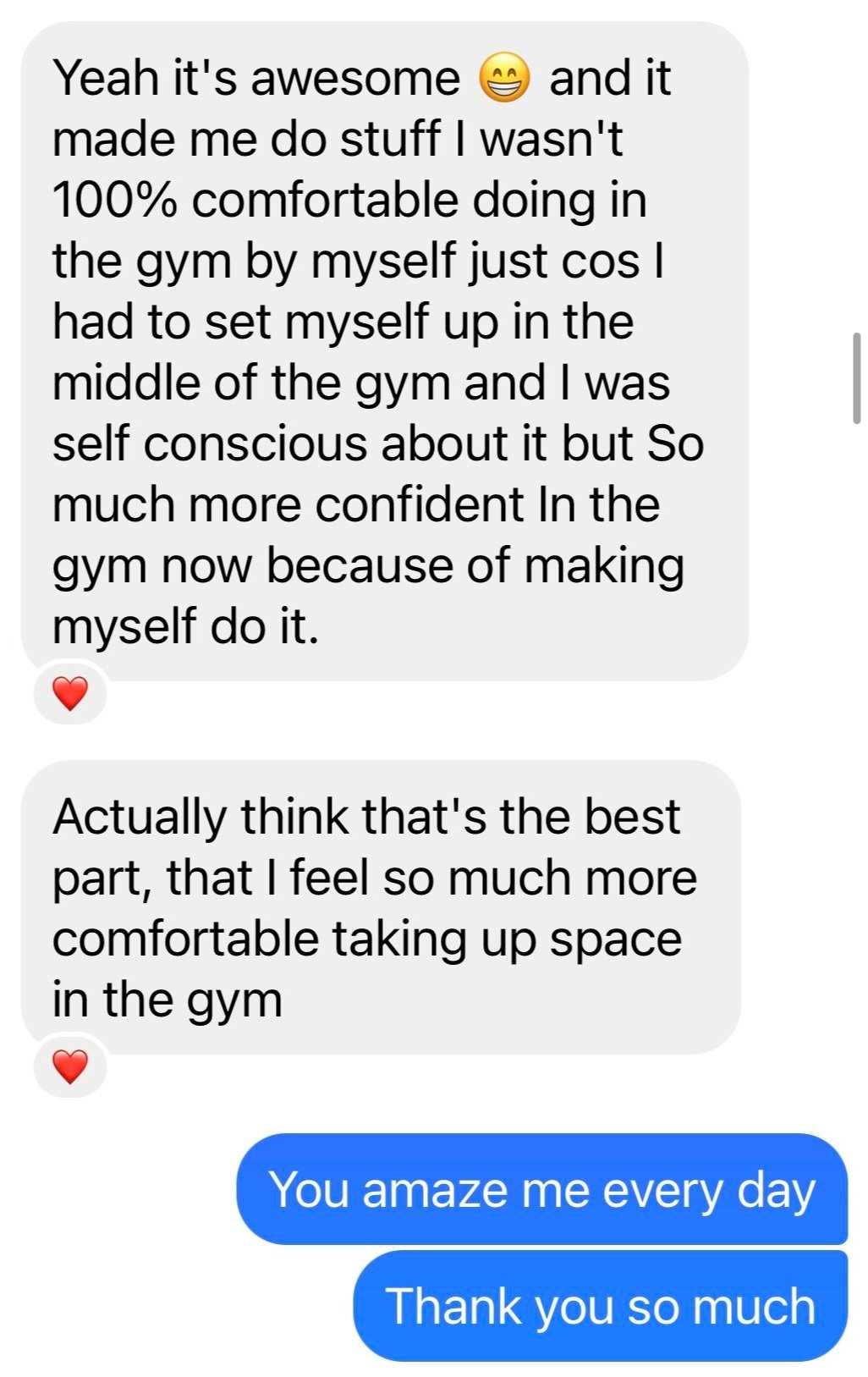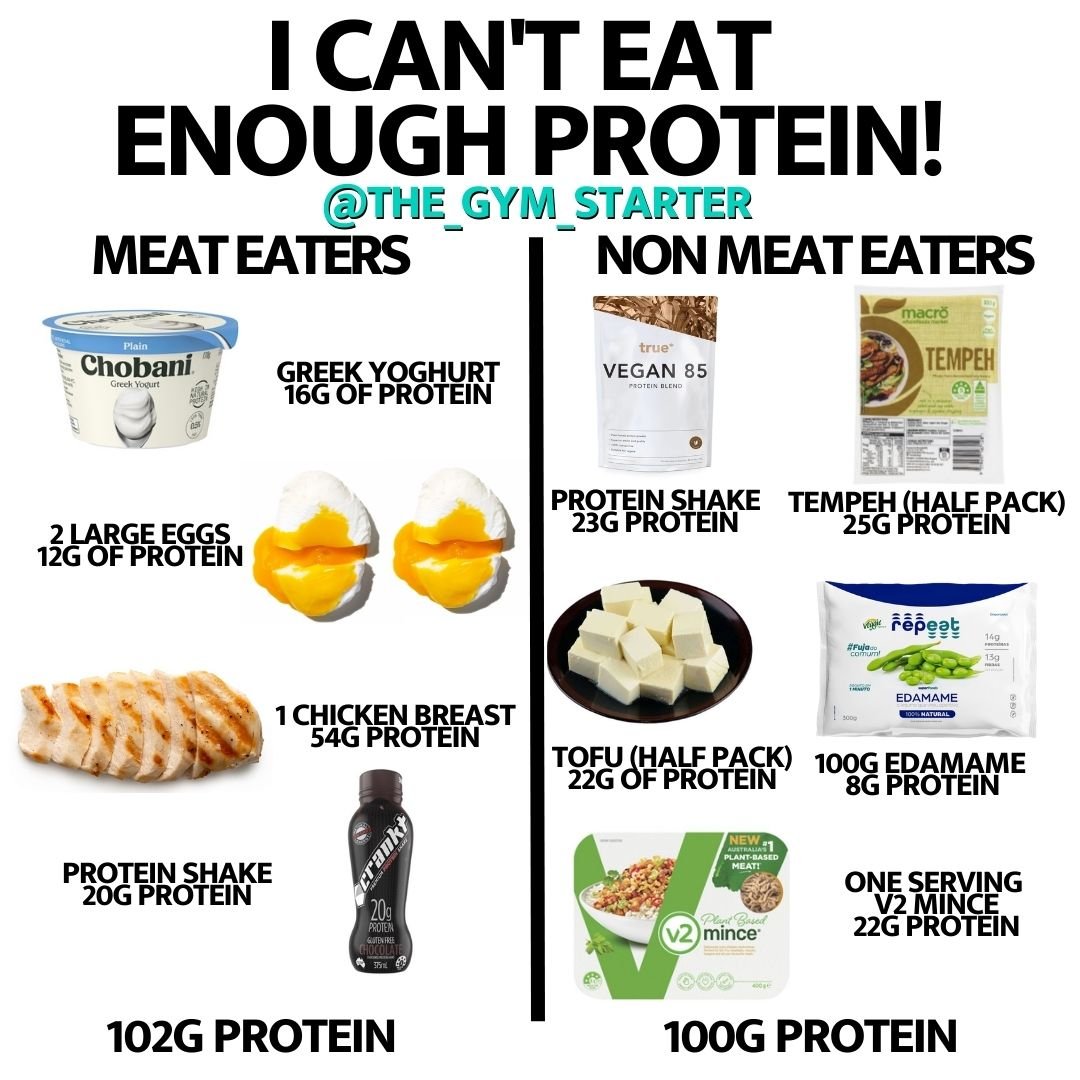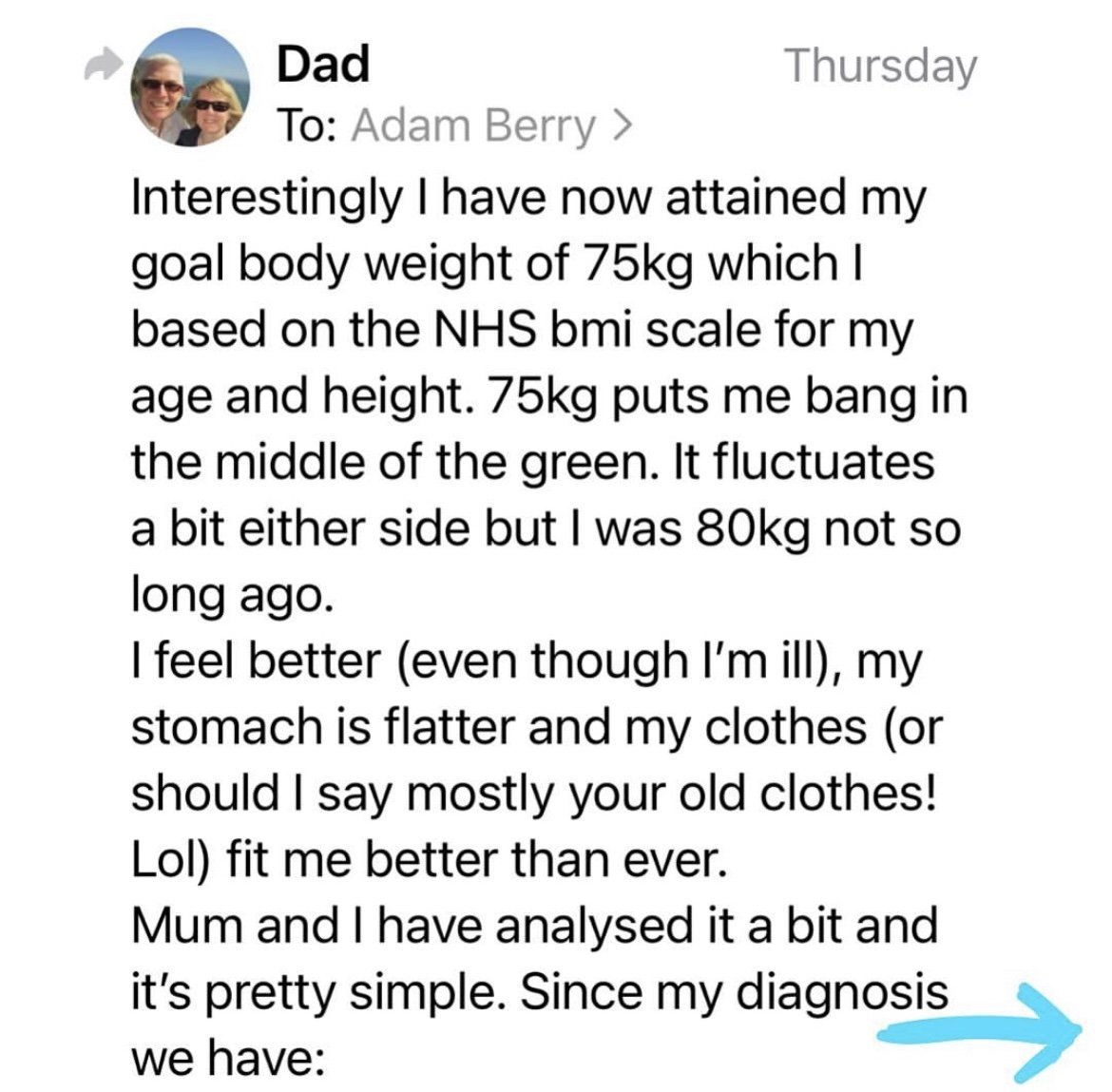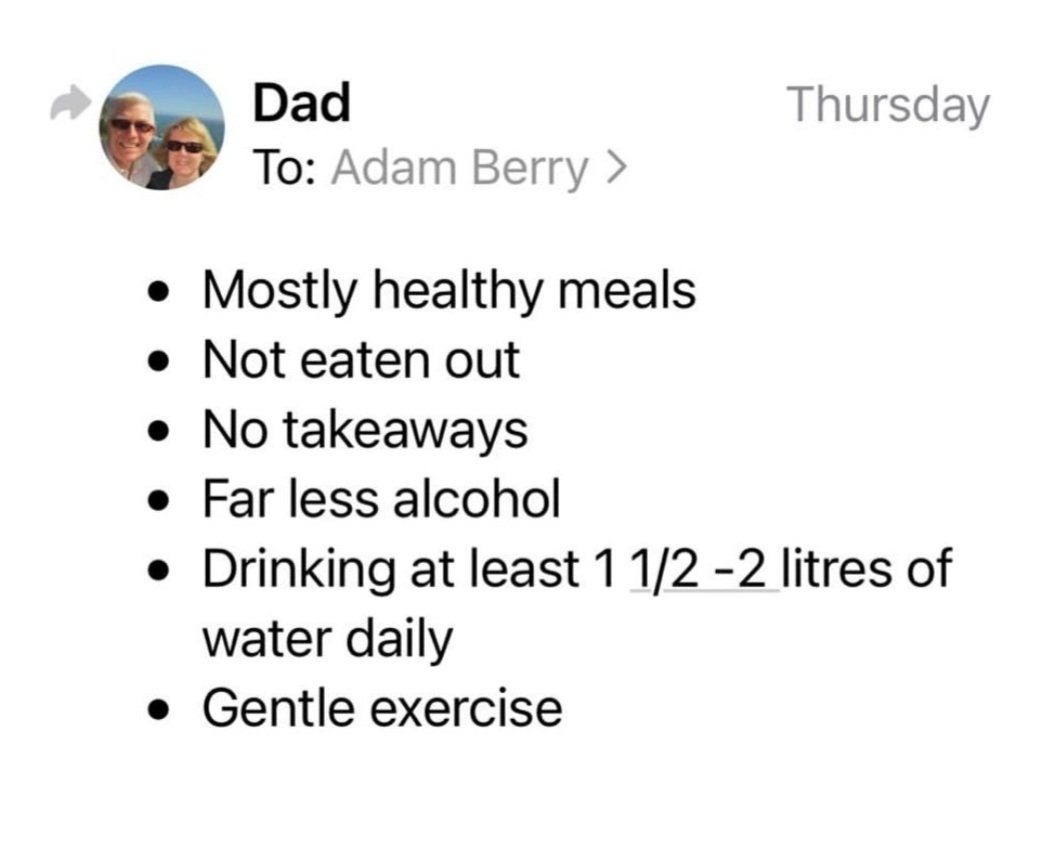Easily Lose Weight Without Counting Calories
In this very website, I have plenty of articles on both sides of the counting calorie conundrum.
(if you want to read those they are at the end of this Blog for your further reading pleasure).
Personally, I am not in favour of counting calories, nor am I against it.
The decision to choose to count calories or not simply comes down to the behaviour patterns and previous dieting history of the person who is trying to figure out whether or not is a good idea to count calories or not.
The list of people who shouldn't be counting calories is:
Anyone who has an eating disorder
Anyone who is a perfectionist
Anyone who suffers with food guilt
Anyone who refuses to eat because it will take them “above their calorie limit”
Anyone who has a history of yo-yo dieting and diet clubs.
If you are in one of those cohorts of people and you are still actively trying to lose weight, then you are in the right place.
If you are not in one of those cohorts of people, but still want to learn more about losing weight…then you are in the right place as well.
Basically…if you are trying to find out more about losing weight…
As always, thank you for being here, and I can’t wait to help you figure this crazy journey out.
Before we progress, you need to be in a calorie deficit to lose weight. This means consuming fewer calories than your metabolism is burning each day, and that can be achieved both through counting calories and without counting calories.
If you need more information on Calorie Deficits then head here.
Table of contents for Easily Lose Weight Without Counting Calories:
Is Calorie Counting the best way to lose weight?
How to be in a Calorie Deficit without counting calories
Signs that you are in a Calorie Deficit
Really Simple Solutions
Is Calorie Counting the Best way to lose weight?
Calorie counting does work.
This study (1) took a cohort of people and found that there was a correlation between consistent trackers and weight loss outcomes:
“Only consistent trackers had significant weight loss (-9.99 pounds), following a linear relationship with consistent loss throughout the year. In addition, the weight loss trend for the rare and inconsistent trackers followed a nonlinear path, with the holidays slowing weight loss and the onset of summer increasing weight loss. These results show the importance of frequent dietary tracking for consistent long-term weight loss success”
But as I mentioned in my introduction if you match any of the cohorts I spoke about, then these results will not be accessible to you.
The other thing I would say is this: calorie counting is the quickest way to know if you are in a calorie deficit. You simply get immediate feedback on what you are eating and provided you have done your calorie calculations correctly, you will know whether or not you are indeed taking the steps to lose weight each day.
If you want to do your calorie calculations then get my calorie calculator sent to your inbox right now.
If you aren’t able to, or just don’t want to count calories, then I will lay out for you exactly how to lose weight within that.
But you will have to meet me half way with regards to the process.
You will need patience.
The only way to know if you are losing weight, for sure, without counting calories, is through consistent work on the process I will outline below, and then comparing month to month at markers that will indicate weight loss - a topic we will get onto later in this blog post.
How to be in a Calorie Deficit without Counting Calories
Over my decade in the fitness industry, I have made many many mistakes. One of those mistakes was asking clients who were contra-indicated to count calories.
In fact, now I am older and wiser, I would argue the vast majority of the people I work with, mainly people just like you, who really want to lose weight, but might also have a very fragile relationship with food, with the scale, with their body image and are low on self-esteem, do not need to count calories.
I am now far less likely to ask a client to count calories when working on their weight loss - and the results I get are just as effective. If not more so, because my clients aren’t reliant on the control that calorie counting gives them, and don’t have to learn to regress.
We go slower to start with, building strong proper foundations, so that they are empowered to be able to stay at a weight that suits them for their whole lives.
In fact, I would also argue, that most people who count calories, lose weight, and then stop counting calories are far more likely to regain their weight, then have to go back to calorie counting to lose it again…and they repeat this process all of their lives.
Also please remember body weight will always fluctuate. It is not a static thing, and in each different phase and aspect of your life different body weights will emerge - and that is ok.
Losing weight without counting calories is possible, but it requires a combination of diet and lifestyle changes to help us make sure that we are getting you into a calorie deficit.
Here are a few tips to help you get started, backed by scientific research.
Let’s start with your dietary changes:
PORTION CONTROL
Portion control is your best friend when it comes to organising your diet into a calorie deficit.
Don't feel like you have to finish everything on your plate: It's okay to leave a little bit of food behind, and it can actually be a good thing to listen to your body's hunger and fullness cues. When your mum told you that you must finish your plate, little did she know that when you grow up, this could have a major impact on your relationship with food? It’s not your mum’s fault, but you must understand that you don’t have to finish your plate as an adult.
Focus on the quality of your food, not just the quantity: Rather than trying to eat less of everything, try to fill your plate with a variety of nutritious foods. Start with Protein, and build your plate around that. One of my Five Awesome Rules for Fat Loss Life is to Protein and Veggies at every meal. This will increase fibre and nutrients which will make you feel fuller for longer whilst losing weight.
Be mindful of your snacking: Snacking can add a lot of extra calories to your diet, so it's important to be mindful of what and how much you're eating between meals. The cliche is true, fruits and vegetables are your best friends when it comes to snacking. Try to limit your snacks to two a day between your meals.
Don't be afraid to ask for a to-go box: If you're eating out and the portions are larger than you're used to, don't be afraid to ask for a to-go box and take the rest home for another meal. This is a massive thing in Australia which I had to get used to. In England, you either finish your plate or leave food on there, you hardly ever get a “doggy bag”. But here its quite common practice - and it’s such a good thing to do. It saves on food wastage, it saves you from overeating, and it means you have leftovers for the next day so you are automatically meal prepped.
Don't deprive yourself: It's important to enjoy your food and not feel like you're constantly depriving yourself. If you really want that second serving or dessert, go for it, but try to be mindful of how much you're eating. Remember balance always.
Find what works for you: Everyone is different, so it's important to find what works best for you and your body. Don't be afraid to experiment with different portion sizes and see how you feel.
2. STRUCTURED EATING
The role of structured eating in your diet has astounding benefits from improving your relationship with food as well as helping you get into a calorie deficit.
However, for the purposes of this article, its use is to regulate and stimulate your hunger hormones (2).
By making sure you regulate these hormones (grehlin and leptin) you will be able to avoid the classic “hangry” feeling and therefore not end up eating everything in sight when you get the opportunity to.
By eating in a structured way, your body will no longer guess when it will and will not be fed, and therefore having a much more regular diet will decrease your overall calories not just during the day, but also over the weeks as well.
This study (3) also concluded:
“While no one eating occasion contributes more than any other to excess adiposity, eating more often than three times a day may play a role in overweight and obesity in both younger and older persons”
The structure you need to stick to is:
Breakfast.
Lunch.
Dinner.
Two snacks.
Each meal must fit on one plate.
You should also eat uninterrupted and participate as much as possible in the making and creating of the food.
The other thing to remember with structured eating is that it requires mindful eating as well. This will help you pay attention to your body's hunger and fullness cues, and eat only when you are hungry and stop when you are satisfied. Avoid distractions like TV or phone while eating, as these can cause you to eat more than you need (4). Mindful eating has been shown to be effective for weight loss and the prevention of weight gain (5).
3. WATER INTAKE
Another one of my five awesome rules for fat loss life is the promotion of trying to drink 3 litres of water a day. This can be a shock to the system, to begin with, but build up slowly and you will be on also remember it is a purposefully high target, because if you fall short you are still covered.
Drinking enough water can help you feel full and satisfied, thus helping your hunger cues be quelled, and helping to keep you in a calorie deficit. I always suggest to clients on the Strong and Confident Program to work towards trying to drink 3 litres a day.
A study of 50 adults found that those who drank 375ml or 500 ml of water before a meal lost significantly more weight than those who did not (6).
Now let’s look at some physical changes you might need to make:
SLEEP
The more I write about fitness, the more I am realising that sleep features in every aspect of your fitness journey. Not just for weight loss, but for performance as well.
You have to get enough sleep. However, I am not ignorant of the fact that if you have a young family that simply will not be possible. I appreciate that, and if that is you, then be aware of the impact of sleep, but don’t get stressed about the fact you can’t access enough sleep; just be aware that when things settle down, you should think about addressing this part of your life.
If you are reading this, and you don’t have a young family or a medical reason that you can’t get enough sleep, and you aren’t getting enough sleep then you need to get enough sleep.
Adequate sleep is essential for weight loss and overall health. In fact, it is that important, I would put it as high up on the list of helping you lose weight as being in a Calorie Deficit.
A review of 17 studies found that people who slept 7-9 hours per night had a significantly lower body mass index (BMI) compared to those who slept less (7).
One reason lack of sleep is associated with weight gain is that sleep deprivation can lead to an increase in appetite, particularly for high-calorie, sugary foods. This is because sleep deprivation can lead to an increase in the hunger hormone ghrelin and a decrease in the hormone leptin, which regulate hunger and fullness. As a result, people who don't get enough sleep may feel hungrier and eat more.
In addition to increasing appetite, sleep deprivation can also lead to an increase in the hormone cortisol, which can promote fat storage and weight gain. This is because cortisol is released in response to stress, and sleep deprivation can be a source of stress for the body.
Furthermore, insufficient sleep can lead to a decrease in physical activity and a decrease in the body's ability to burn calories effectively. This is because sleep deprivation can lead to fatigue and decreased energy levels, making it harder for people to be physically active. It is also not uncommon to see a drop in fidgeting and other calorie-burning activities throughout the day, because of tiredness.
Overall, it is important to get enough sleep in order to maintain a healthy weight. The National Sleep Foundation recommends that adults aim for 7-9 hours of sleep per night.
2. STRUCTURED MOVEMENT
As I mentioned above, we need to work on both sides of the energy balance equation to easily create a calorie deficit, especially if you aren’t counting calories.
The most important thing for you to remember when it comes to physical movement, in pursuit of losing weight, is to not view calorie-burning as the reason you are exercising.
Yes. Exercise does burn calories.
No. You don’t have to earn your calories in the gym.
Yes. Exercise is amazing for your overall health.
No. Exercising doesn’t burn as many calories as you would think.
Yes. Exercise is a great tool to help keep you on track dietarily and emotionally with a weight loss goal.
All exercise will help you create a calorie deficit. Notice the word “help”?
The most important aspect of exercise with regards to this is that you chose the exercise you enjoy the most because you will then be far more likely to continue doing it for long enough to see results.
I very recently got this message on Instagram in relation to a workout I give away for free:
The person who sent me this, was in a phase of not counting calories, although she is quite calorie aware, and she was wanting to begin the journey of feeling her best for her wedding which is in a few weeks (as I write this), and she is about 7 months post-partum.
The results are immense. But for me, the best result isn’t the weight loss she created, its the fact she felt more empowered as a result of exercising, and she is evidently more confident as a result of getting stronger. Its the dream scenario.
The workout she completed was this:
If you want the same strength workout I gave her then just put your email address in here and I will send it to you in a day or two:
Or if you would like a four-week beginner strength training routine for beginners with video tutorials then head here.
Aim for 2-3 workouts a week, which last for about 30-40mins and that make you feel two inches taller when you walk out of the Gym compared to when you walked in, and you will be right where you need to be when it comes to working out.
3. INCREASING YOUR NEAT
You could look up any advice about losing weight across the whole internet, and I promise you that every weight loss plan you find will feature something in relation to your NEAT.
Non-Exercise Activity Thermogenesis.
This is the largest portion of your daily caloric burn. It is responsible for burning as many calories as structured movement and how many calories you burn through digestion combined.
Essentially the simplest way it can be measured is by your step count.
But there are other aspects of it as well. When I designed my five awesome rules for fat loss life, I made one of those rules: 10k Steps A Day.
Science has since shown that 10k steps a day are not necessarily needed for improving your health, the figure stands at around 7.5k steps a day if you are only focused on improving your health.
But as you aren’t counting calories, and I am telling you that you can lose weight easily, then we need to put in some targets here.
This is the simplest way to make sure that your step count is right:
Take your previous month’s daily average number.
Multiply it by two.
That is your new step count.
Then after about two weeks, you need to multiply it by two again.
And continue doing this all the way up to 10k steps a day and then keep it there as consistently as possible.
Now if you just don’t have time to fit in that amount of steps a day in, there is another solution. We need you to walk faster. If all you have is the maximum time in your day to do 5k steps a day, then a great way of making that 5k steps as effective as possible for you is that every time you walk, do it with as much purpose and direction as you possibly can.
Don’t dilly-dally. You aren’t strolling, you are walking with the intention to get to your destination as effectively as possible.
Other great ways to increase your NEAT are:
Incorporate more movement into your daily routine by using a standing or adjustable desk.
Take regular stretch breaks throughout the day to loosen up and move your body.
Take the stairs instead of the elevator or escalator whenever possible.
Walk or bike to the store or grocery shop instead of driving or taking public transportation.
Park further away from the grocery shop in the car park.
Every time there is an ad break on TV, climb your stairs three times.
Wear ankle weights when walking.
Take up a new hobby that involves movement such as rock climbing, ice skating or roller skating.
Do some gardening.
Every time there is an ad break on tv, use it as a Dance Break instead.
Never sit down when you are on the phone, always stand or walk.
Take the kids or grandkids to the park and play games or sports with them.
Carry your shopping as opposed to using a trolley.
Walking is your solution to most things. Emotional stress, physical stress, or maybe you just need to find some more energy to help get through the day. You might want to improve the quality of your sleep or even to help you easily lose weight without counting calories, I promise you, walking solves more issues than you will ever thought possible.
How Do You Know If You’re In A Calorie Deficit
As I mentioned earlier, counting calories gives you instant feedback on whether or not you are in a calorie deficit.
So if we are taking counting calories away, it is useful to know what other signs you can look for, to get similar feedback on your progress.
Here are the kinds of things I always tell clients to keep aware of to measure their success when they aren’t counting calories:
SCALE WEIGHT
This one is always tricky as many people who aren’t counting calories, likely won’t be the most comfortable with getting on the scales either.
However, if we are directly answering the question of “easily losing weight”, then at some point you will likely check in with your body weight.
Now read this very carefully:
You should only compare your scale weight on a monthly basis, not weekly, to determine if you are in a calorie deficit or not.
You can track daily, or you can track weekly. But from only comparing Day 1 to Day 31 will you know if you are in a Calorie Deficit or not.
This is because scale weight is a fickle fiend and comparing weight loss on a shorter timescale will drive you insane due to all the fluctuations involved.
Please, if you want to look at your scale weight in relation to easily losing weight only compare monthly readings.
2. MEASUREMENTS
These are probably your better friend than scale weight to track your progress. Again, only compare on a monthly basis maybe even a 6-week basis. Another great sign of your measurements changing is feeling different in your clothes - if you feel like they are fitting you better, or you feel like you are wearing them better, then you are probably making an impact on your measurements.
The measurements I ask my clients for, if they are comfortable doing this, are the following:
Neck
Chest
L Bicep
R Bicep
Waist at the Belly Button
Waist 2in below the Belly Button
Waist 2in above the Belly Button
Hips
L Thigh
R Thigh
3. WORK IN PROCESS PICTURES
I don’t call them before or after photos. I don’t call them “progress pictures” either.
Simply because a photo solely looking at your physique, can often cause more issues than it solves. It automatically puts you into a mindset of “the way I look is all that is important”.
And it’s not.
The way you look is one aspect of you, and it is likely one of the last reasons anyone enjoys being with you.
Think of your friends. Are you only friends based on the size of their body? Of course not.
So I like to try to change the narrative of photos. Your work in process pictures are just that, designed to capture your process and the changes you are seeing along your journey.
This could be, photos of you working out, or on walks.
This could be family snaps where you remember not feeling awkward in the photo.
This could be a photo on a night out where you didn’t automatically feel anxious when someone asked for a picture, and you resisted the urge to want to look at it, in case you didn’t like it and wanted it deleted.
These are work in process pictures.
When you engage in a weight loss journey, sure weight loss is the goal, but in truth its the least interesting goal that actually occurs.
Use your photos to celebrate your journey, celebrate your building confidence, celebrate your consistency, celebrate your confidence changing as you progress.
These are all signs of progress too, aside from seeing your belly reduction on two photos that are six weeks apart.
Your physique can and will change. But a photo only focussed on your physique will never capture the internal changes that have occurred to you over time. Get photos that describe your internal monologue as well.
Document that progress.
It’s so much more rewarding.
4. CONSISTENCY
Another incredible sign that you are in a calorie deficit is recording your consistency. Tick off these things:
How regularly you are getting your workouts in
How regularly you are keeping your structure with food
How regularly you feel less guilty about the food you are eating
How regularly you are trying to move away from calling foods “good” and “bad”
How regularly you are getting your steps in
How much water you are drinking
How regularly you are getting 7-8 hours sleep a night
You can do this on a calendar, a tracking app or a journal.
Remember there is a key difference between consistency and perfection. In order to be consistent you need to be hitting your goals and habits 25 days out of 30 in a month.
5. HUNGER
Going to bed and feeling a little hungry is also a good sign that you are in a calorie deficit. At no point in your life do you want to be ravenous, and hunger should be managed relatively well throughout the day, especially if you have a structure with your food.
But going to bed and feeling a little hungry is a good sign that you are in a calorie deficit.
Really Simple Solutions
When I first became a Personal Trainer, one of the firs things my Coach gave me to work on was the concept of KISS.
Keep, It, Simple, Stupid.
And therefore over the years, I have always worked on trying to distil weight loss and fitness into the simplest and most effective messaging I can come up with.
And here is what seems to have stuck:
THE 3, 4, 5 SYSTEM
I remember where I was when I came up with this a few years ago. I was on the Gym Floor with one of my best Australian friends, Ben. I had been training him for nearly a year at this point, and he was aware his life was getting busier again, and it was about to cause havoc on his progress. I could never get Ben to track his food, so I asked him to stick to this.
3 litres of water a day.
4 movement sessions a week; Walking, Workouts and anything else you might enjoy.
5 moments with food every day: 3 meals, two snacks.
Its simplicity gave me so much joy. I then introduced it to one of my online clients in Colorado, doing my Strong & Confident Program and she sent me this as it was her lock screen to keep her on track.
What a beautiful idea.
DAILY AWESOME SALAD
The DAS.
Get your protein source. Add a huge bag of salad and some carby veggies.
Job done.
Do this for lunch each and every day. It’s easy to prep, its cost-effective, and it will do a good job.
BUILD MEALS AROUND PROTEIN
Start with protein.
Then add veggies to your plate.
Then if you look at your meal and still feel like you need something else, add a Carbohydrate source.
Try to aim for 100g of protein a day. This is the equivalent of:
My recommendation to clients is to always start with 100g of protein a day, or if you are vegetarian or vegan then aim for 80g of protein a day.
You can get more complex if you like, but if you don’t want to count calories, then there really isn’t much of a need to past those recommendations.
And always make sure it fits on one plate, as mentioned in the structured eating section of this article.
FIVE AWESOME RULES FOR FAT LOSS LIFE
I have written about these many times.
In a nutshell, they are:
Be in a Calorie Deficit
10k steps a day
7-8 hours sleep a night
Protein and Veggies at every meal
3 litres of water a day
If you want to find out more about how these rules work then head here:
5 Easy Ways To Do A Calorie Deficit Without Working Out
FOLLOW THE DADDY HUMPHREYS PLAN
Here is my Dad and I, out on the Golf Course back in Essex where we used to live together. I since moved to Australia. My Dad was recently diagnosed with Cancer at the age of 67.
He recently went from 80kgs to 75kgs in a matter of about 4 months.
He has never been overweight or really had any body weight concerns. But when he got Cancer, he was told that getting his BMI down a touch would be helpful, and would help him feel better in general.
His Cancer is quite serious, it is Stage 4, and he can only get onto Maintenance drugs to help him, never into full remission or be Cancer free.
But in terms of his treatment, it has all been relatively easy compared to what most people go through with chemotherapy. His side effects have been some hiccoughs, and interrupted sleep and that’s about it. My point is, he didn’t suffer weight loss as a result of his treatment.
He got his bodyweight down through behaviour, none of which was counting calories.
Here is what he did:
As you can see, it’s a pretty simple, and sensible solution.
The Daddy Humphreys Plan: I wonder if it will sell….
What’s Next…
Well, I am an Online Coach who has helped thousands of people work through the challenges in this article.
And it would be my pleasure to help you too.
My program is personal one-to-one online training called the Strong & Confident Program.
If you have ever wanted to achieve the following:
✅ Escape the constant dread of dieting?
✅ Release the guilt you attach to eating certain types of food?
✅ Learn to stop worrying about “the pesky last few pounds” and focus on all your body can do?
✅ Become truly happy with what your body is and what is capable of?
✅ Enjoy the feeling of being stronger and fitter as opposed to trying to reduce your size all the time?
✅ Achieve all of this and still lose body fat at the same time without huge restrictions and slavery to a fitness regime?
✅ Do it all on your own schedule, in your own way, with a program specifically designed for you?
Then please click on the button below and fill out an application form to start working with me.
If you feel like you need more help learning how to lose weight and release the need for counting calories then you can look through the following articles of mine as well:
Thank you so much for reading my work, and good luck with building a stronger relationship with food.
I cannot wait to see how you go!
Coach Adam
References:
Ingels JS, Misra R, Stewart J, Lucke-Wold B, Shawley-Brzoska S. The Effect of Adherence to Dietary Tracking on Weight Loss: Using HLM to Model Weight Loss over Time. J Diabetes Res. 2017;2017:6951495. doi: 10.1155/2017/6951495. Epub 2017 Aug 9. PMID: 28852651; PMCID: PMC5568610.
Klok, M.D., Jakobsdottir, S. and Drent, M.L. (2007), The role of leptin and ghrelin in the regulation of food intake and body weight in humans: a review. Obesity Reviews, 8: 21-34. https://doi.org/10.1111/j.1467-789X.2006.00270.x
Howarth NC, Huang TT, Roberts SB, McCrory MA, Lin BH. Eating patterns and dietary composition in relation to weight change over 7 y. American Journal of Clinical Nutrition. 2001;73(2):209-218.
Van Walleghen EL, Hogg MM, Bell EA, Rolls BJ. Television viewing increases motivated responding for food and energy intake in adults. American Journal of Clinical Nutrition. 2010;91(4):829-835.
Kristeller JL, Hallett CB. An exploratory study of a meditation-based intervention for binge eating disorder. Journal of Health Psychology. 1999;4(3):357-363.
Pre-meal water consumption for weight loss. (2013). Australian Family Physician, 42(7), 478. https://search.informit.org/doi/10.3316/informit.405716872190923
